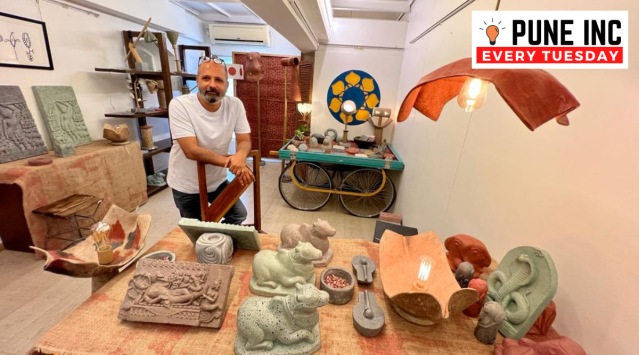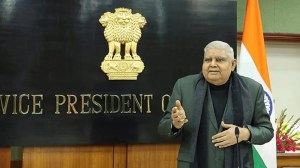Punc Inc: Pune artist and startup founder offers a pathway to lower carbon footprint
Advanced Nature has created a material to treat and recycle waste, ranging from cloth to slag to silicon.
 Jesh Krishna Murthy with eco-friendly products made out of waste at the Advanced Nature shop. (Express photograph by Arul Horizon.)
Jesh Krishna Murthy with eco-friendly products made out of waste at the Advanced Nature shop. (Express photograph by Arul Horizon.) In a store dominated by lamps in contemporary designs, Jesh Krishna Murthy sits surrounded by light. Located in Sangamwadi, the shop-within-a-shop (it shares space with another brand, Either Or) is introducing customers in Pune to Krishna Murthy’s innovative idea for sustainability. His startup, Advanced Nature, started one-and-a-half years ago and launched the store around March.
After years of experiments, Krishna Murthy has created a solution in which a range of waste, from fly ash and industrial slag to fabric and e-waste, can be treated to create raw materials for products. Available at the store is a brick made with slag and fly ash, among others. It shares space with lightweight figurines that have decorated tables.
Industry in India is gradually aligning with the country’s sustainability goals, but there are few alternatives yet in the market. A Bain and Company report from 2022 indicates that consumers in Asia-Pacific are a driving force behind the region’s interest in purchasing sustainable goods. Among 16,000 Asia-Pacific consumers surveyed, 90 per cent said that they are willing to spend a premium on sustainability products but don’t buy these goods due to a lack of information or the simple fact that they don’t trust claims of sustainability.
 After years of experiments, Krishna Murthy has created a solution in which a range of waste, from fly ash and industrial slag to fabric and e-waste, can be treated to create raw materials for products. (Express Photo by Arul Horizon)
After years of experiments, Krishna Murthy has created a solution in which a range of waste, from fly ash and industrial slag to fabric and e-waste, can be treated to create raw materials for products. (Express Photo by Arul Horizon)
“Consumers surveyed in Asia-Pacific’s fast-growing markets (China, India, Indonesia, Thailand, Malaysia, the Philippines, and Vietnam) are more conscious of environmental and social factors than those in the more mature markets of Australia, Singapore, Japan and South Korea,” reads the report.
Krishna Murthy is an award-winning VFX and animation professional and a self-taught artist. Advanced Nature was born during the Covid pandemic when he began to study the chemistry of waste. This led him towards research into the architecture of forts that have outlasted many modern buildings. “I found that, centuries ago, an essential raw material for construction was lime. I studied how molasses and pulses were used. These created robust surfaces. I wondered what would happen if I put waste into such a mixture,” he says.
He started putting cloth waste, paper waste, agricultural waste and plastic waste, among others, into the solution and, after hundreds of trials and errors, created the solution that is at the heart of Advanced Nature. How scalable is his idea? Krishna Murthy says that the company can produce five million bricks every day. “But, my model is not on scalability but employability. The country needs employment for the people,” he says, adding that he plans to set up production clusters in villages across the country.
Advanced Nature’s workshop is in Hadapsar Industrial Estate and employs 30 people from rural areas. His retail plans are centred in Pune. “I will get into e-commerce. For instance, where is sustainable packaging? My current strategy is to own the sustainable home market in the city. If I can do this, every other market will open up. Unlike most startups, I am not focussing on scaling quickly but on being solid so that we build an institution that will outlive us,” he says.
As for the solution, Krishna Murthy is open to JVs, tie-ups or royalty systems on the material with other organisations. “What if, instead of using traditional cements, rock aggravates and river sand, which is what they use in construction, we synthesise low carbon footprint cement-free concrete made with the chemistry of industrial wastes? Our cement-free concrete has been tested for strength and found to be almost strong enough to build a bridge,” he adds.













